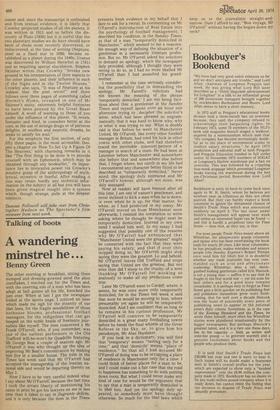Bookbuyer's Bookend
"We have had very good union relations so far and we don't anticipate any trouble," said Lord Allan, chairman of Longman Penguin last week. He was giving what Lord Hill later described as a "thinly disguised advertisement for Longman" in a talk to an influential group of 200 investment managers brought together by stockbrokers Buckmaster and Moore. Lord Allan seems to have a short memory.
In 1972 staff at Penguin's educational books division held a three-month ban on overtime because, they said, the company refused to acknowledge their bargaining rights. In February 1973, some 75 members of the NUJ's book and magazine branch staged a walkout, angered by a memorandum which said that "the company has become increasingly doubtful as to the place of incremental scales in modern salary structures." In April 1973 production and editorial staff at both Penguin and Penguin Education handed in full strike notice. In November 1973 members of SOGAT at Longman's Harlow warehouse put a ban on overtime. This was followed by a crippling four-week stoppage which prevented Longman books leaving the warehouse during the key pre-Christmas period. Remember now, Lord Allan?
Bookbuyer is sorry to have to come back once again to W. H. Smith, whom he believes are nowhere near as villainous as they are often painted. But they can hardly expect a book columnist to ignore the threatened closure of Smith's Trade News which was announced suddenly on April 3. The last issue under Smith's management will appear next week and unless an interested buyer can be found — and this is hardly a propitious time for Fleet Street — then that, as they say, is that.
For most people Trade News meant above all Whitefriar, the idiosyncratic gossip columnist and tipster who has been entertaining the book trade for nearly 20 years. Like most columnists, he has prejudices, makes mistakes and annoys people (the Sunday Express's Robert Pitman once sued him for libel) but it is doubtful whether any trade journalist has ever commanded such an avid and affectionate readership. Whitefriar, alias a tall, distinguished looking gentleman called Eric Hiscock, is not a young man — suffice it to say that he fought in the first world war — yet his nose for best sellers and for a good story remains remarkable. It is perhaps easy to forget as Fleet Street gets a little quicker on its publishing feet and publishers themselves grow more forthcoming, that for well over a decade Hiscock was the fount of practically every piece of publishing news to appear in the _national press's diary colums. Sometimes, as in the case of the Evening Standard and the Times, he wrote them himself; more often his Whitefriar stories were plundered unashamedly by the bigger newspapers. But perhaps Hiscock's greatest talent, and it is a rare one these days, lies in his capacity — both as writer and wine-bar gossip — to generate warmth and a genuine excitement about books and the people who produce them.
It is said that Smith's Trade News lost £30,000 last year and one is sorry to hear it. Such losses will no doubt make a fearsome dent in Smith's overall profits for the year, which are expected to show only a "modest improvement" over the E9.86 million the company made in 1972. Bookbuyer has no desire to hit any multi-million pound company when it is really down, but cannot resist the feeling that the decision to dispose of Trade News was absurdly premature.


































 Previous page
Previous page